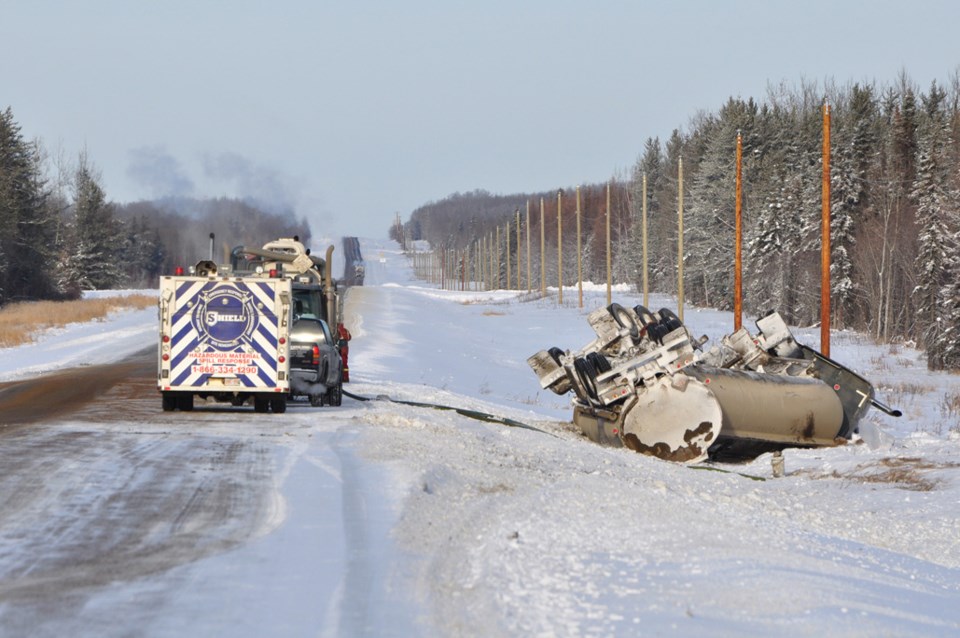Boyle RCMP was called to the scene of a northbound semi transport truck full of diesel fuel that lost control at approximately 3:30 a.m. and flipped into the east ditch of Highway 831 between Highway 661 and Highway 663 in the early hours of Monday morning. The driver escaped uninjured.
Boyle RCMP was called to the scene of a northbound semi transport truck full of diesel fuel that lost control at approximately 3:30 a.m. and flipped into the east ditch of Highway 831 between Highway 661 and Highway 663 in the early hours of Monday morning, causing a fuel spill. The driver escaped uninjured.
Boyle RCMP Cst. Alex Ayres received the call at 3:37 a.m. and arrived on scene to find a fuel truck flipped over in the east ditch, with fuel slowly drizzling from it.
"I would say road conditions were absolutely a factor," said the constable.
The Boyle Fire Department was called in after RCMP determined fuel was leaking from the tanker. Edmonton-based Cliff's Towing arrived around 6 a.m., and a hazardous materials vehicle was sent in by the trucking company in to assist in the recovery operation and address environmental concerns, according to Ayres.
Ayres confirmed the truck was hauling two full trailer lengths of diesel fuel at the time of the accident but only one of the tanks were compromised in the turnover.
The process spanned more than six hours, during which time the tanker had to be drilled into for the extraction truck to gain access to the fuel load. The cleanup was then able to contain the spill.
Bubba Magnus, a Cliff's Towing worker guiding southbound traffic said the truck operator was still at the scene at midday, assisting with the recovery of the massive vehicle, as traffic was reduced to one lane.
Magnus said another truck had to be brought in to extract the load before a cleanup of the area could begin.
The tanker remained inverted for about nine hours. Precautionary measures were taken due to the nature of the load, said Magnus.
RCMP issued an advisory at 6:14 a.m. on Monday advising traffic to take other routes in case the highway needed to be blocked off completely.
A semi truck driver who wished to be unnamed (we will call him Joe) working for RBS Bulk Systems, stopped in southbound traffic, was carrying highly flammable fuel in his own tanker.
Joe said that despite the size of the trucks, and the safety switches some have in the cab to enable various traction control techniques, it is still very easy for larger trucks to lose control as quickly as it takes for a driver to reach for a cup of coffee.
"The most dangerous part would have been while it was unfolding. He (may have been) sliding, skidding. Had he had a spark and had it bust open, then it could have ignited," said Joe, a 40-year veteran of hauling big rigs.
"These tankers are really well maintained, as far as performance [in] a problem [situation]," he said.
Joe said while the trucks are safe to drive, they are not impervious to mishaps such as this.
Joe said that in his experience he has found the trucks sensitive to control; the heat of the oversized tires can cause ice and snow on the road to melt and generate black ice, in some certain conditions making these big rigs a liability to surrounding traffic, he said.
For that reason, it's safer for smaller trailing vehicles to keep in the left lane, said Joe, out of the slippery tracks of the trucks.
Joe said on the upside, the lower temperatures help keep volatile fuels more stable, but the type of fuel can vary the danger level.
"Right now gasoline is that cold that … it will still ignite, but it will take quite a bit. Diesel - you could probably throw a match on that and it won't do (anything). It just gets to that threshold (cold) level where nothing bad will happen to it."
Ayres urges drivers to "slow it down" when conditions are poor, take time to get to their destinations in one piece this holiday season, and "if need be, reevaluate whether they need to get to where they're going."
Despite the slightly better conditions than would be effecting the fuel in the heat of the summer months, even a minimal movement can cause the driver to lose control in the cold of winter that has now caused six serious accidents in the Athabasca and Boyle region in the past eight days, at least two of which involved multiple vehicles.
